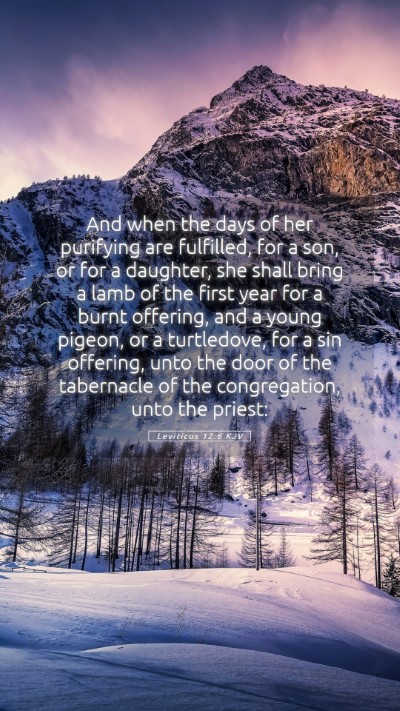Understanding Leviticus 12:6
The verse Leviticus 12:6 is part of the Old Testament ceremonial laws regarding childbirth and purification. It provides specific instructions for a mother after the birth of a child, highlighting themes of cleanliness and spiritual readiness. This analysis combines insights from respected public domain commentaries including those by Matthew Henry, Albert Barnes, and Adam Clarke.
Verse Text
Leviticus 12:6 (KJV): "And when the days of her purifying are fulfilled, for a son or for a daughter, she shall bring a lamb of the first year for a burnt offering, and a young pigeon, or a turtle dove, for a sin offering, unto the door of the tabernacle of the congregation, unto the priest."
Context of the Verse
The laws in Leviticus were given to the Israelites to regulate their worship and maintain their holiness as a people separated for God. This specific chapter addresses the purification process for women following childbirth, acknowledging both the physical and spiritual aspects of motherhood.
Analysis and Interpretation
- Purification After Childbirth: The requirement for a burnt offering and a sin offering emphasizes the importance of purity. Henry highlights that the time of purification serves to reflect on the sanctity of life and brings the mother back into fellowship with God.
- Symbolism of Offerings: The lamb symbolizes the need for a perfect sacrifice, prefiguring Christ's ultimate sacrifice. Barnes notes that these offerings are both acts of worship and acknowledgment of sin, reinforcing the idea that our lives are interwoven with the divine covenant.
- Role of the Priest: The priest facilitates this reconciliation with God, underscoring the mediator's importance in restoring spiritual wholeness post childbirth (Clarke). This is reflective of broader themes of priesthood and sacrifice present throughout Scripture.
- Implications for Women: The passage also reflects on the transitional period women experience postpartum. It acknowledges their physical recovery and spiritual needs while providing a structured way to return to the community of faith, as pointed out by Henry.
- Broader Theological Significance: Albert Barnes elucidates the broader implication of these rituals as highlighting the need for atonement and the continual state of needing to approach God with a heart of repentance and faith.
Practical Applications
Leviticus 12:6 calls believers to recognize the ongoing need for spiritual cleansing and the importance of seeking God’s presence, regardless of life circumstances. This understanding can be applied to modern life in various ways, such as:
- Understanding the importance of community: Just as the mother brought offerings to the priest, engaging in community worship and accountability remains vital today.
- Recognizing the sacredness of life: This verse encourages a deep respect for the process of giving life and its accompanying responsibilities, linking motherhood with spiritual significance.
- Reflection on personal purification: It invites believers to assess their own lives for areas requiring cleansing and repentance.
Conclusion
In summary, Leviticus 12:6 provides a profound insight into the themes of purity, sacrifice, and the transition back to a state of communal worship after childbirth. By interpreting this verse with a blend of historical understanding and spiritual application, Christians can gain a richer appreciation for how these ancient practices speak to their modern faith and daily lives.
Related Cross References
- Leviticus 12:2 - Regulations concerning childbirth
- Leviticus 14:1-32 - Purification after leprosy resembles the theme of restoration
- Hebrews 10:19-22 - Reflection on believers’ access to God through Christ


